
Atlanta is the capital and most populous city of the U.S. state of Georgia. It is the seat of Fulton County, the most populous county in Georgia, although a portion of the city extends into neighboring DeKalb County. With a population of 498,715 living within the city limits, it is the eighth most populous city in the Southeast and 38th most populous city in the United States according to the 2020 U.S. census. It is the core of the much larger Atlanta metropolitan area, which is home to more than 6.1 million people, making it the eighth-largest metropolitan area in the United States. Situated among the foothills of the Appalachian Mountains at an elevation of just over 1,000 feet (300 m) above sea level, it features unique topography that includes rolling hills, lush greenery, and the most dense urban tree coverage of any major city in the United States.
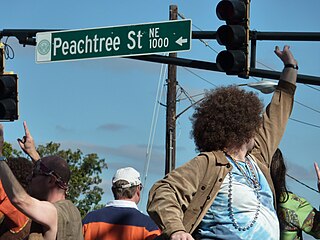
Peachtree Street is one of several major streets running through the city of Atlanta, Georgia, United States. Beginning at Five Points in downtown Atlanta, it runs North through Midtown; a few blocks after entering into Buckhead, the name changes to Peachtree Road at Deering Road. Much of the city's historic and noteworthy architecture is located along the street, and it is often used for annual parades,, as well as one-time parades celebrating events such as the 100th anniversary of Coca-Cola in 1986 and the Atlanta Braves' 1995 and 2021 World Series victories.
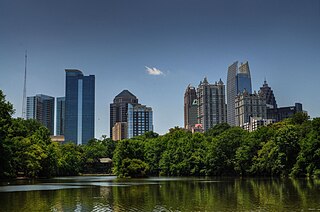
Midtown Atlanta, or Midtown, is a high-density commercial and residential neighborhood of Atlanta, Georgia. The exact geographical extent of the area is ill-defined due to differing definitions used by the city, residents, and local business groups. However, the commercial core of the area is anchored by a series of high-rise office buildings, condominiums, hotels, and high-end retail along Peachtree Street between North Avenue and 17th Street. Midtown, situated between Downtown to the south and Buckhead to the north, is the second-largest business district in Metro Atlanta. In 2011, Midtown had a resident population of 41,681 and a business population of 81,418.

Buckhead is the uptown commercial and residential district of the city of Atlanta, Georgia, comprising approximately the northernmost fifth of the city. Buckhead is the third largest business district within the Atlanta city limits, behind Downtown and Midtown, a major commercial and financial center of the Southeast.

Downtown Atlanta is the central business district of Atlanta, Georgia, United States. The larger of the city's two other commercial districts, it is the location of many corporate and regional headquarters; city, county, state, and federal government facilities; Georgia State University; sporting venues; and most of Atlanta's tourist attractions. It measures approximately four square miles, and had 26.850 residents as of 2017. Similar to other central business districts in the United States, it has recently undergone a transformation that includes the construction of new condos and lofts, renovation of historic buildings, and arrival of new residents and businesses.
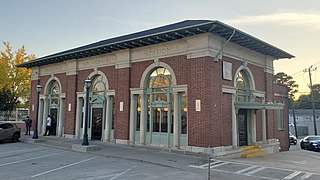
Atlanta Peachtree Station is a train station in Atlanta, Georgia. It is currently a service stop for Amtrak's Crescent passenger train. The street address is 1688 Peachtree Road, Northwest, in the Brookwood section of town between Buckhead and Midtown.

Clear Creek is a stream in northeast Atlanta that is a tributary to Peachtree Creek and part of the Chattahoochee River watershed. It has two main branches, one originating east of the high ground along which Boulevard runs and another to the west originating on the northeast side of downtown Atlanta. The easterly branch of Clear Creek begins in several springs and branches in what are now Inman Park and the Old Fourth Ward. Flowing north, the creek was joined by other branches and springs, including Angier Springs near the end of Belgrade Avenue and the so-called Ponce de Leon Springs, which were “discovered” during railroad construction in the 1860s and gave rise to the eponymous park and avenue.

Ponce de Leon Avenue, often simply called Ponce, provides a link between Atlanta, Decatur, Clarkston, and Stone Mountain, Georgia. It was named for Ponce de Leon Springs, in turn from explorer Juan Ponce de León, but is not pronounced as in Spanish. Several grand and historic buildings are located on the avenue.
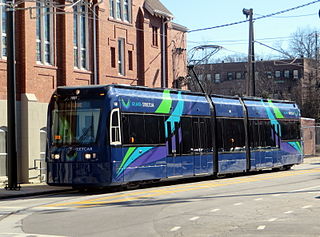
Atlanta Streetcar or Downtown Loop is a streetcar line in Atlanta, Georgia, United States. Testing on the line began in summer 2014 with passenger service beginning as scheduled on December 30, 2014. In 2022, the line had 158,000 rides, or about 300 per weekday in the fourth quarter of 2022.
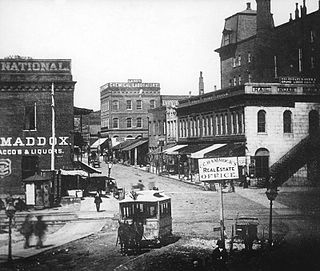
Streetcars originally operated in Atlanta downtown and into the surrounding areas from 1871 until the final line's closure in 1949.

Located at 1315 Peachtree Street in Atlanta, Georgia, United States, "MODA is the only museum in the Southeast devoted exclusively to the study and celebration of all things design."

English Avenue and Vine City are two adjacent and closely linked neighborhoods of Atlanta, Georgia. Together the neighborhoods make up neighborhood planning unit L. The two neighborhoods are frequently cited together in reference to shared problems and to shared redevelopment schemes and revitalization plans.
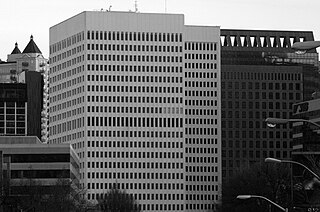
Colony Square is a mixed-use development and sub-district in Midtown Atlanta, Georgia, located on Peachtree Street in between 14th and 15th Streets. The oldest high-rise development in Midtown, the sub-district was built between 1969 and 1975, with Henri Jova of Jova/Daniels/Busby serving as principal architect. It was the first mixed-use development in the Southeast.

Atlanta Streets Alive is a ciclovía held throughout the year in Atlanta, Georgia, United States. Ciclovía is Spanish for a temporary closing of the street to automobiles for use by people participating in recreational activity. Organized by the Atlanta Bicycle Coalition, Atlanta Streets Alive opens streets for people in the city of Atlanta by temporarily closing them to cars to create a whole new healthy, sustainable and vibrant city street experience. People can walk, bike, roller-skate, jog, skip and roll down 3 to 5 miles of major thoroughfares that have been closed to cars throughout Atlanta three or four times a summer. Throughout the route there are activities and examples of tactical urbanism inspired to help citizens envision shared streets. In 2018, the Atlanta Bicycle Coalition connected the routes for Atlanta Streets Alive with their street campaigns to drive energy towards demanding more complete and shared streets in the city of Atlanta.
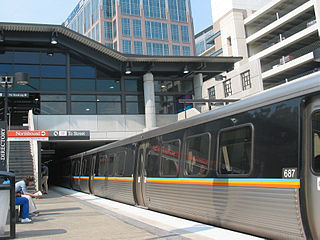
Lindbergh, officially Lindbergh/Morosgo, is a neighborhood in the Buckhead district of Atlanta, Georgia. Most of the neighborhood consists of multi-use development combining retail, office and residential space.
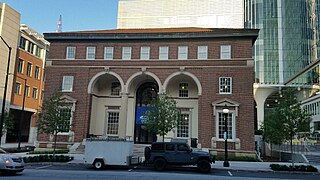
The Crum & Forster Building is a 1928 three-story building with a Renaissance façade with columns and arches located at 771 Spring Street at Tech Square in Midtown Atlanta.
Cheshire Bridge Road is a mainly north–south thoroughfare of Atlanta, Georgia, USA traversing the Morningside-Lenox Park and Lindridge-Martin Manor neighborhoods from Piedmont Avenue to Buford Highway just north of Interstate 85.
Henri Vatable Jova (1919-2014) was an American architect and preservationist. With Stanley Daniels and John Busby, he founded Jova/Daniels/Busby, a multidisciplinary design firm based in Atlanta, Georgia, which designed several notable projects in Atlanta and throughout the Southeast from 1966 to 2013. Jova is noted for his pioneering support of mixed-use development and interest in the development of Midtown Atlanta.
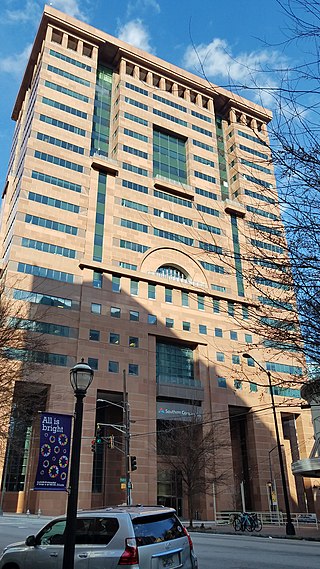
Ten Peachtree Place is a high-rise class A office building in midtown Atlanta, Georgia. The building was designed by Michael Graves and completed in 1989. It currently serves as the headquarters for Southern Company Gas. The building is notable for its 30-foot-high arch and red granite exterior that contrasts with the building's dark windows.
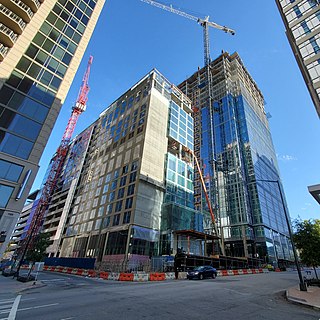
1105 West Peachtree is a mixed-use development currently under construction in Atlanta, Georgia, United States. Located along West Peachtree Street in Midtown Atlanta, the development would consist primarily of a 32-story office building and a smaller residential tower called 40 West 12th.




















